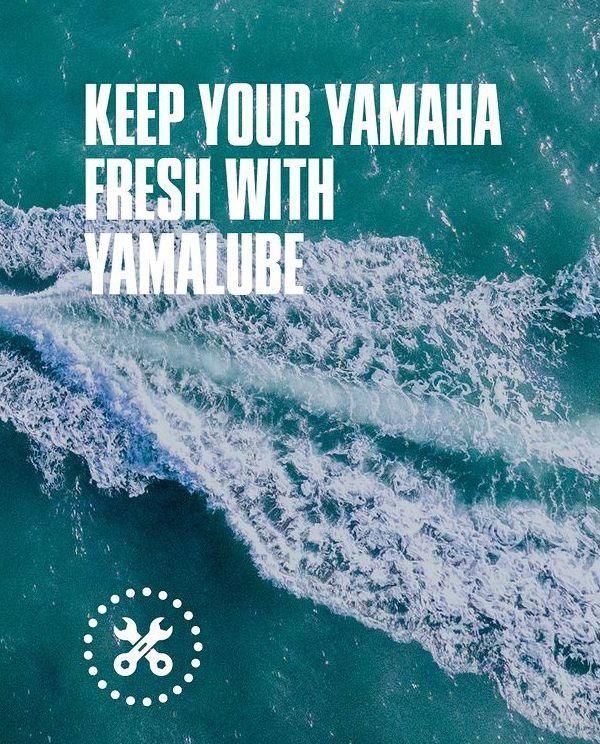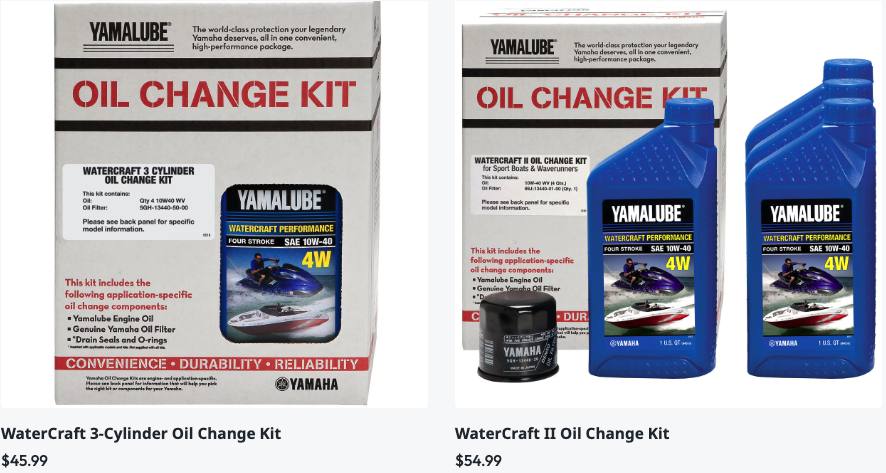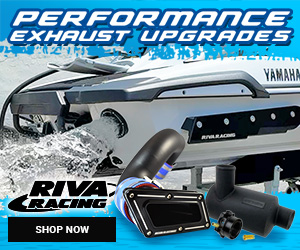 The concept is bottom-level basic – maintenance is mandatory, not recommended.
The concept is bottom-level basic – maintenance is mandatory, not recommended.
This especially holds true for changing the oil on your PWC.
Yamaha recommends changing oil every 50 hours, saying that changing your engine oil regularly helps preserve engine health. Old oil contains contaminants that can harm your engine, while fresh oil ensures smooth operation. And Yamaha takes smooth operation seriously.
“At Yamaha, there is no single department in charge of oil,” said Mike Ricciardi, Yamaha WaterCraft Product Development Manager. “Rather, oil development is carried out by engineers in charge of developing and building our engines. We have taken extraordinary steps in the development of Yamalube lubricants. We have our own oil certification committee. This group brings together both our own chemical engineers and the very same team who designs our engines having access to proprietary specifications about our engines. This group has an unmatched pool of knowledge from which to draw in creating oil formulas that far exceed all other competitive brands.”
Visually, oil for personal watercraft and boats and oil for cars doesn’t look very different, but there are significant differences in how they are used, Ricciardi stresses.
As marine engines are for use on the water, rust prevention is one obvious concern, but the biggest is the load these engines are subjected to being that its common practice to run marine engines at full throttle for hours on end.
“Our Yamalube oil for Yamaha WaveRunner and Boat engines is blended specifically to deliver enhanced protection and durability as well as peace of mind on the water,” said Ricciardi. “As our boats and PWC evolve, Yamalube is the only line of care products that can keep up.”
 Specifically crafted for Yamaha boats and personal watercraft, Yamalube undergoes rigorous testing to guarantee a smoother, more confident ride every time you hit the water. Specially formulated to combat rust and corrosion, safeguarding your engine from marine elements, Yamalube offers top-tier protection, engineered to excel under extreme conditions and extends engine life by minimizing wear.
Specifically crafted for Yamaha boats and personal watercraft, Yamalube undergoes rigorous testing to guarantee a smoother, more confident ride every time you hit the water. Specially formulated to combat rust and corrosion, safeguarding your engine from marine elements, Yamalube offers top-tier protection, engineered to excel under extreme conditions and extends engine life by minimizing wear.
Yamalube and oil change kits are available directly from Yamaha, and are available at many of WCJ’s partnering retailers.
Following are some oil change tips and tutorials straight from Yamaha:
Checking your oil level.
The oil level check procedure for your Yamaha four-stroke WaveRunner is a bit different than the procedure for your car. It’s easy to get an accurate reading if you follow the procedure outlined in your owner’s manual. A few things to keep in mind:
Always check your engine oil level with the engine up to full operating temperature.
It is OK if the oil level is anywhere within the hash marks of the oil level dipstick.
If you do need to top off your engine oil, be sure to use Yamalube® 4W 10W-40 Oil
What oil should I use?
The engine in your Yamaha WaveRunner is vastly different from your automotive engine; so avoid regular automotive engine oils. Use a motor oil specifically formulated for the rigors of the marine environment, like Yamalube 4W for four-stroke WaveRunners, and Yamalube 2W for two-stroke WaveRunners.
Let’s look at a few reasons why:
Engine load. The typical loads placed on your WaveRunner are much heavier than on your automobile, having to overcome a much greater amount of drag to create performance. This means your WaveRunner is working much harder than your automobile’s engine. Yamalube 4W and 2W marine engine oils contain specific anti-wear additives to account for this.
Engine speed. Your WaveRunner operates at a much higher RPM than your automobile’s engine. It must rev higher to create higher speeds, rather than just changing gears like your car. That means your WaveRunner may run all day long at 4500-6000 RPM, rather than the 2500 RPM your car reaches at highway speeds. That’s tough on your oil and can literally shear (or split) the molecules in ordinary automotive oil, reducing lubricity. Yamalube 4W and 2W have special shear-stable polymers to combat this and provide superior lubrication at all times.
Operating temperature. WaveRunners are cooled using raw water, which is often cool to very cold. On the other hand, saltwater will begin to crystalize if its temperature is raised above 170°, potentially causing blockage in the cooling passages and leading to engine overheat and possible damage. Because of these two factors, your WaveRunner operates full-time at a temperature much lower than your automobile and requires very different qualities in its lubricating oil. Yamalube marine oils have detergents, dispersants and viscosity index improvers to meet these marine-specific challenges head-on.
Operating Environment. Your WaveRunner is constantly near water, sucking in very humid air directly off the water’s surface in order to operate. This humid air also gets inside combustion chambers through open valves when the engine is not running. And in a saltwater environment, that air is even more corrosive. It’s one of the harshest environments imaginable for an engine. Yamalube 4W and 2W are purposely formulated with special anti-corrosion agents to help combat and prevent the corrosive effects of this environment.
Yamalube® WaveRunner engine oils provide specific protection other oils don’t, using a proprietary blend of marine-specific anti-wear additives, shear-stable polymers, corrosion inhibitors, detergents, dispersants and viscosity index improvers. In short, they’re far superior to automotive engine oils in their strength of protection, durability and corrosion resistance.
Aren’t all oil filters pretty much the same?
Outwardly, perhaps. But it’s what’s on the inside that counts most. Yamaha oil filters are manufactured specifically to protect Yamaha engines, using only the finest components and construction methods available. This includes a special filter media and metal filter media bases (instead of cardboard), to help them achieve a level of durability and filtration far superior than most “off-the-shelf” oil filters. From the quality of the materials used to their high-quality construction, they simply outperform and out-protect most aftermarket alternatives.
What Yamalube oils are right for my WaveRunner?
Yamalube 4W: Reformulated to better protect your investment from the harsh effects of cold starts, hours of trolling and high-load, high-speed operation, its special anti-corrosive additives are particularly suited for the harsh marine environment.
Yamalube 2W: This Yamaha-formulated oil provides outstanding protection for two-stroke, water-cooled engines, with its special blend of additives that help combat ring stick, corrosion, varnish and wear. It’s a standard by which other two-stroke oils are judged.
Can I change my own oil?
Absolutely, but you don’t have to. If you’d rather leave it to your Yamaha WaveRunner dealer, they will be happy to take care of it for you in their specially trained and properly equipped service department. That also means you won’t have to dispose of the used oil yourself. But if you prefer to do it yourself, your Yamaha dealer can set you up with a Genuine Yamalube Oil Change Kit, specific to your Yamaha WaveRunner. It includes the right type and amount of Yamalube oil, and a Genuine Yamaha oil filter.






